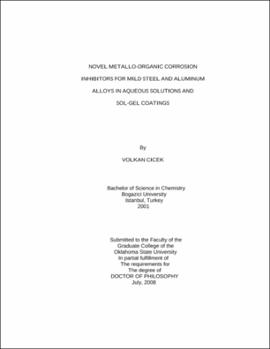| dc.contributor.advisor | Apblett, Allen | |
| dc.contributor.author | Cicek, Volkan | |
| dc.date.accessioned | 2013-11-26T08:21:24Z | |
| dc.date.available | 2013-11-26T08:21:24Z | |
| dc.date.issued | 2008-07 | |
| dc.identifier.uri | https://hdl.handle.net/11244/6449 | |
| dc.description.abstract | Scope and Method of Study: The objective of this research was to develop novel metallo-organic corrosion inhibitors for mild steel and aluminum alloys to be employed in aqueous solutions and sol-gel coatings. For this reason, inhibitors that are commonly used for corrosion inhibition of mild steel and aluminum alloys were combined under one formulation in order to result in synergism. Among chosen inhibitor constituents were α-hydroxyacids and other hydroxy-acids and their salts along with metal oxyanions. Occasionally, these inhibitor constituents had to be synthesized as well if none available commercially. Gluconates and benzilates were the most commonly used hydroxy-acid salts, while molybdates, vanadates, and borates were the most commonly used metal oxyanions. As for cationic constituents, zinc, trivalent chromium, and calcium cations were used the most. Synthesized compounds were then characterized by means of different techniques and were put into test later for their corrosion inhibition efficiencies. First, corrosion inhibition efficiencies in aqueous solutions were measured by weight-loss tests. If any indication of a conversion coating formation on the substrate surface was present, it was characterized using different surface techniques. Immersion solutions before and after completion of weight-loss tests were also characterized for the common solution properties using a variety of probes. Secondly, inhibitors with optimal water solubilities that successfully inhibited aluminum corrosion in aqueous solution were incorporated into sol-gel coating. Aluminum 2024 substrates coated with sol-gel enriched with inhibitor pigments then were tested in a salt-fog chamber in accordance with ASTM methods. | |
| dc.description.abstract | Findings and Conclusion: Novel metallo-organic corrosion inhibitors were synthesized and a considerable number of them were found to successfully inhibit mild steel and aluminum corrosion in aqueous solutions and sol-gel coatings. | |
| dc.format | application/pdf | |
| dc.language | en_US | |
| dc.rights | Copyright is held by the author who has granted the Oklahoma State University Library the non-exclusive right to share this material in its institutional repository. Contact Digital Library Services at lib-dls@okstate.edu or 405-744-9161 for the permission policy on the use, reproduction or distribution of this material. | |
| dc.title | Novel metallo-organic corrosion inhibitors for mild steel and aluminum alloys in aqueous solutions and sol-gel coatings | |
| dc.contributor.committeeMember | Materer, Nicholas | |
| dc.contributor.committeeMember | Slaughter, LeGrande | |
| dc.contributor.committeeMember | High, Martin | |
| osu.filename | Cicek_okstate_0664D_2805.pdf | |
| osu.accesstype | Open Access | |
| dc.type.genre | Dissertation | |
| dc.type.material | Text | |
| thesis.degree.discipline | Chemistry | |
| thesis.degree.grantor | Oklahoma State University | |
